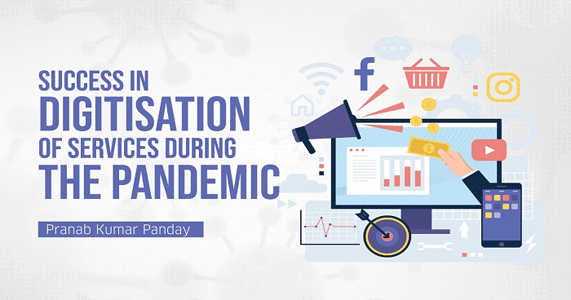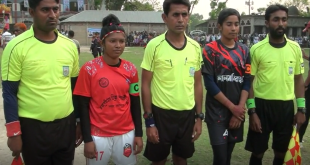Pranab Kumar Panday:
The COVID-19 cataclysm has brought into focus the potentials of digital communication in everyday life. Digital technology was crucial to confront the consequences of staying at home as most of the countries in the world endured lockdown. The responsible authorities have succeeded in ensuring sustainable access to disaster prevention over the early days of the pandemic. Different countries of the world have steadily changed the modalities of services with their long-term commitments in this field. This has made it possible for people to continue their activities in education, remote employment, and carrying out the momentum of growth through e-commerce.
Like other countries of the world, the imposition of restrictions on people’s movements a mechanism of restraining the catastrophe of COVID-19 presented the Bangladeshi government with avenues for transforming various services online. The experience of online services might be better in developed countries as they have better infrastructure relating to digitisation. However, Bangladesh is not lagging far behind as compared to other countries. Naturally, in view of continued efforts to implementing activities aiming at establishing a digital Bangladesh despite the lack of awareness of a vast majority of the countrymen about the use of digital services, was a challenge for the government to meet the enormous demands of the online services during the pandemic. However, the government took the challenge to cope with the new normal lifestyle triggered by COVID-19 as the establishment of a digital Bangladesh was one of the electoral pledges of the present government. The government has been carrying out different policies and strategies under the direction of Sajeeb Wazed Joy, ICT Advisor to the Prime Minister for transforming different services online during the pandemic.
Though the government is yet to implement all the strategies necessary to digitise everything, they have indeed attained tremendous success in transforming many of the online services. If we examine the state of digitisation from the perspective of different sectors, it becomes clear that the government has started realising its target in almost every sector. Farmers are receiving different types of information using various apps and using online customer care services of the agriculture department. They could even get updates on weather forecast using the apps. They can also sell their products using the apps during the pandemic.
Online based delivery of different services has improved dramatically. Now, people can fill their application form for e-passport; pay the application fee and schedule an interview for the submission of the application from their homes. There has been a revolution in the context of banking services. People can now deal with their banking transactions online. Telephone banking like bKash, Nagad and Rocket has made people’s life very easy. Nowadays, the users do not require to wait at long queues to pay the bills of their utility services. These bills can be paid through online and telephone banking from home. This has saved people from exposing themselves from getting contaminated by the lethal coronavirus.
The growth in internet access has contributed to a significant increase in the number of cellular subscribers. Currently, around 160 million people use mobile phones in the country. The social network has become an influential networking tool that goes beyond national territorial boundaries. Being the citizens of the global village, our people can stay connected with the citizens of different countries. People can now speak to their relatives and family members living abroad through different apps using the internet connection. This has brought a revolution in the field of communication in the country.
The student community is the worst victim of the COVID-19 pandemic as all the educational institutions in the country have remained shuttered since March 18, 2020. Due to fear of experiencing a prolonged academic career, the students and their guardians have become profoundly disappointed. On the other hand, there is an apprehension that the student dropout rates at the primary level might increase. Many of the students are also terrified of being spoiled as we know that “an idle brain is the devil’s workshop”. The government has nevertheless made every attempt to continue online education. The government has adopted numerous policies at the primary and secondary level to prevent students from being adversely impacted. One strategy of the government is to offer teaching to the primary and secondary students through the parliament television channel. Of course, the efficacy of this strategy is doubtful, but they aim to help students keep in contact with their teachers and the academic environment.
With the leadership of the government, the private and public universities have been taking online classes to save the students’ academic career. Implementing such a decision was not an easy task as it requires strong internet connections and uninterrupted electricity. The government has negotiated with different internet service providers to offer low-cost internet connection that has helped students to stay connected to their classes online. BTCL has been offering very low-cost internet service to the students using student sim card. Of course, the public university students are still struggling as they could not sit for examinations online in contrast with the students from private universities who are completing their degrees online. This is due to the obligations of the public university authorities to abide by the acts and rules that prohibit them to take online examinations. Despite having some challenges, we must appreciate the accelerating growth of digitisation that has helped students to continue with their education.
The admission process at different levels at the educational institutions is now mostly being done online. The government has successfully completed the admission of the students at the intermediate level through the online system right at the peak of the COVID-19 pandemic. All the admission related activities at the tertiary levels are being conducted online nowadays. This has not only helped the students and their guardians in saving them for being exposed to any contamination but also ease the burden of the guardians related to travel and its associated expenses.
The online marketing industry has expanded quite rapidly due to the development of ICT even during the pandemic. When people are urged to stay at home, the growth of transaction of online business is several times higher than before. People nowadays prefer to buy and sell products online through numerous online portals. This has not only made our lives very easy but also created an opportunity for the government to earn a huge amount of revenues in the form of TAX and VAT.
In addition to posing health-related problems, COVID-19 pandemic has also created tremendous pressures on the government to provide its services and sustain the economic momentum. Thus, the transformation of online services was one of the most important options for the government to sustain in such a critical situation. And the government has succeeded in coping with the new normal life-transforming traditional services into digital forms. The relentless works of the government under the direction of the ICT Adviser to the Prime Minister has allowed the government to overcome these challenges. The commitment that was made in 2008 has started to be realised in full swing. Of course, more efforts and time are required to optimise the maximum benefit of digitisation. However, we must step in the right direction, if we wish to manage to overcome the COVID-19 pandemic successfully. The day is not far when the country will be considered a role model of digitisation in South Asia.
Writer: Professor of Public Administration and an Additional Director of the Institutional Quality Assurance Cell (IQAC), University of Rajshahi
 নারদ বার্তা পরিবর্তনের অঙ্গিকার নিয়ে
নারদ বার্তা পরিবর্তনের অঙ্গিকার নিয়ে


